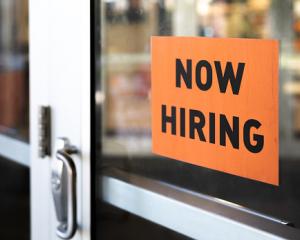The National Party's strong polling has led to market complacency around the potential for policy shifts following the September 20 election, Forsyth Barr broker Andrew Rooney says.
However, Mr Rooney warns National is polling lower than it did in 2011 and its normal voting constituency is less than 50%.
''This means nerves may once again be tested as the election draws closer.''
A National-led government was still the mostly likely outcome, given the difficult the left voting bloc created in accumulating sufficient support and the number of supporting parties required, Mr Rooney said.
If 2014 polling followed historic trends and National's polling started driving lower closer to the election, it might provide opportunities in the market as some of the market's complacency was removed.
Electricity generators wore the greatest policy risk, given the number of Opposition parties supporting the introduction of a single electricity buyer model. That might see greater discounts being applied to those valuations in order to reflect the risk.
''As we believe National's vote will have to fall below 46% before there is a risk of change in government, we will look to buy on any fall in these share prices.''
IMPLICATIONS OF A POLLING FADE
The Labour Party alternative budget was released in June, targeting debt reduction and was more moderate than many expected, Mr Rooney said.
The top marginal tax rate was only 36% and only on income above $150,000 Capital gains taxes would be introduced under Labour but would not be retrospective, would exclude the family home and gains and losses taxed at 15%.
The likely impact of the policies on equity markets would be the single-buyer electricity model and the impact on sentiment from the introduction of a capital gain taxes.
Other policies to be mindful of and potentially affecting financial markets were. -
• Introduction of living wages imposing additional costs and potentially reducing competitiveness of New Zealand businesses.
• SkyCity Entertainment might be affected by a review of the New Zealand Convention Centre contract.
• A carbon tax or broader emissions trading scheme could increase fuel costs and reduce export competitiveness of carbon-emitting industries.
• No new mines and stricter controls on energy developments could impact exploration.
• Tougher alcohol and smoking legislation and additional moves to limit duty-free allowances.
''Unfortunately, given the multitude of parties that may need to be cajoled, slippage should be expected and the layering of additional regulation and interference in market structures would hurt business and investor confidence.''
POTENTIAL OPPORTUNITIES
Financial markets disliked uncertainty so any uncertainty created by the potential for an alternative election outcome should see share prices ease as the election drew closer, Mr Rooney said.
The sector with the greatest policy risk was electricity generators, given the broad support for a single-buyer model by most Opposition parties.
Based on a status quo outcome, the sector offered good value for risk but various stocks within the sector could ease if greater election uncertainty was built into share prices.
Based on an analysis of the impact of the introduction of a single-buyer model on various generators, Genesis and Meridian carried the greater risk, with less than 20% probability of the introduction of the policy implied in current share prices.
Mighty River and TrustPower share prices implied about 50% probability, while Contact Energy's share price would imply 100% probability of its introduction.
''As we approach the election, and assuming the polls follow historic trends, a narrowing of National's lead could see pressure on the electricity sector.
''Given we doubt the Left can form a credible coalition, we would use any weakness as a buying opportunity.''
Stocks favoured by Forsyth Barr, based on value for risk were Contact Energy, TrustPower and Mighty River Power.
Gaming was another easy target sector for taxation or populist policies, Mr Rooney said.
The Adelaide capital development was the larger driver of any earnings uplift for SkyCity but increased parking and extending the life of licences in Auckland were important outcomes for the convention centre developments.
SkyCity might fall on increasing project risk as the election approached and Mr Rooney's concern remained on SkyCity's ability to achieve adequate return on the project investments.
''Given some concern regarding achieving adequate return on upcoming investments, we would not target SkyCity unless there was a significant pull back in its share price.''
Mining and exploration representation on the New Zealand market was small. The listed constituents were primarily New Zealand Oil and Gas and Oceana Gold, he said.
Any slippage in the polls could increase the perception of increased risks to extraction industries and also of higher royalties on oil production.
If implemented, the royalty increases would significantly reduce oil and gas exploration activity in New Zealand and drive investment by local participants offshore. That would be negative for sentiment.
''Given the contribution to New Zealand's economy and that all coalition members would need to support such measures, it is likely any shift would be less than the worst-case scenario - if indeed implemented at all.''
CARBON EMISSION TAXES
Labour had opposed the Greens' proposed carbon tax and indicated its preference for a broader emissions trading scheme, while leaving the door open for negotiation, Mr Rooney said.
Companies which were high carbon emitters could be negatively affected by sentiment should polling fade occur.
Transport companies would likely adopt a fuel surcharge strategy to help pass on costs so it would be companies competing against imports most at risk, he said.
Among listed companies. -
• Higher cost of energy could affect Fletcher Building with higher cost cement competing against non-taxed imports.
• Refining New Zealand margins could be reduced by higher taxes and its competitive advantage eroded by imports.
• Sanford could face higher fuel costs relative to international competitors.
• Transport companies would face higher fuel costs but in the past those had tended to be passed through by surcharges. While some of the cost could be borne by the operators, it was not anticipated it would significantly impact valuations.
Taxes being introduced on dairy earlier could also reduce farm profitability and production, reducing Fonterra's potential profitability.
The Left
• Current polling suggests the Opposition parties combined will not have sufficient votes to form a government but the election is likely to be closer than many believe.
• Labour's polling is tracking in line with the 2011 polling and near the low end of its traditional support level.
• The green vote has fallen back to the support level it had in the last election.
• The split of the centre-left vote, now the Internet-Mana Party has entered the fray, may affect the formation of a coalition.
• Who would New Zealand First support if its party vote achieved the required 5% threshold?
The Right
• National may be polling above 50% of the party vote but investors need to recognise the election result is likely to be much closer.
• National is polling lower than it was in 2011.
• National's election-day result tended to be lower than lead-in polls.
• National is unlikely to maintain over 50% of the vote.











